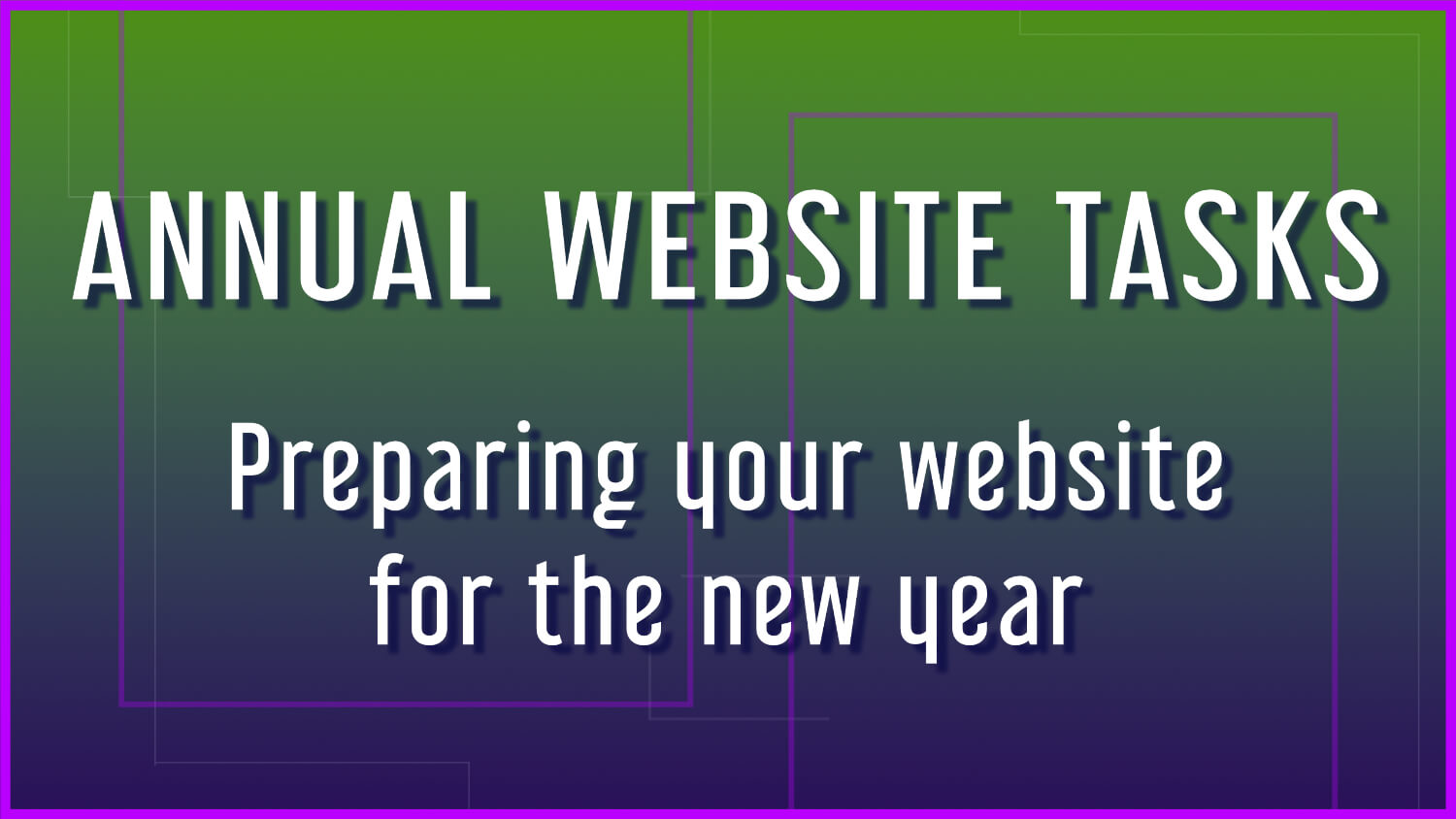There are plenty of things you should do to keep your website running smoothly. Quarterly tasks, monthly tasks, there are even weekly things you could be doing to help your website be an incredible asset for you.
But what about yearly? If you’re already keeping an eye on your site, is there anything that happens yearly, or is it another one of those “new year, new you” remixes that get thrown around every year?
Actually, yes! There are a few things that an annual milestone could be useful for.
Prefer audio or video? Listen to the podcast or watch on YouTube!
Check your copyright date
Now I’ve seen before some suggesting you don’t actually even need a copyright date. But I’m not a lawyer so I won’t pretend to tell you what the right way is. But if you’ve chosen to use one, an outdated copyright doesn’t give full confidence in how up to date it is.
The current year can be set dynamically, meaning you don’t have to go in and manually update it every year, so if you decide to include it and have that as an option, I’d recommend going that route.
Of course, that does mean the current year in the copyright isn’t always a great indicator of if the site has actually been updated, so it’s mostly for the trust and confidence factor rather on the psychological side.
So now’s the time to talk with someone who can provide proper guidance on whether you actually need the year. And if you choose to use the year, make sure it’s accurate. A current year is anywhere from neutral to positive, while a past year is a negative.
Review your goals and strategy
The new year seems to be one of the more widely recognized “fresh start” dates, which means it’s a great time to evaluate your website.
We all know how hard it is to see our resolutions through and turn them into long term changes or habits. It’s the strategy that makes all the difference, and connecting to the reasoning behind those goals or resolutions.
It’s important to check in every now and then to see if your website is still reinforcing the other efforts you’re putting in. A lot can happen in a year, and looking at the big picture and how those individual blog posts and pages contribute to that.
Some questions you can have in mind when reviewing your site:
- How has our intended or ideal audience changed?
- Does our content and messaging still align with that?
- Are we guiding people to the right areas of the site, bringing them the most relevant information for what they’re looking for?
- Do all the pages feel like they’re part of a cohesive plan and brand?
- How well has the website held up? Does anything need a design refresh?
- Is it a pain to update the site, and does that contribute to us making less updates to it?
How you answer those questions will help determine how you go about planning for your site in the coming year.
Check in on hosting and domain
Now’s also a good time to review your hosting choice. It’s a good way to have peace of mind that the main service that keeps your website up and running is still the ideal and reliable choice for your site.
You can ask questions like:
- Are you happy with your host?
- Have there been any problems? How many?
- How fast were those problems resolved? How was support?
- Is it easy to do what you need to do?
- How easy would it be to restore a backup?
Then you can do a quick search to see what else is out there. There are a ton of hosts, so look into ones that have the types of features you need in the right price range and with the right amount of room for growth. I have a quiz you can take that can help with your hosting choice and see if it aligns with your current host.
And while you’re there, check on your domain renewal. Is it set to auto renew?
Review content and implement processes
Reviewing and checking in is a great thing to do, but it doesn’t have much impact if there isn’t a concrete plan to follow through. Your specific tasks are going to depend on your site and what you find when you’re reviewing your strategy, but the general idea is the same.
Ideally there are processes set up for things like making sure plugins and such stay up to date, but most of the time, when you interact with your website, it will involve adding or editing some portion of your content.
Outdated information anywhere else is a bit of a flag, so now’s a good time to make a list of all the places where dates and other yearly things need to change, like holidays or days you’re closed. Some types of information should at minimum be reviewed once per year, but it’s even better when you can make it part of your existing processes.
For instance, when your address changes, you have to update your bills and notify your family. If your contact info is on your website, add that to the website update list. When you fill an open position, remove the job listing.
Same with staff. When someone joins the team, you onboard them (provide logins, fill out paperwork, etc). When they leave, you offboard them (remove from accounts, revoke building access, etc). If you have your staff on your site, you’ll want to add updating the website to those lists. And how long has it been since the headshots were updated? People’s faces change over time!
As you’re reviewing the site, make a note of how long it’s been since you’ve published a blog post. Not all sites need a blog, but if you’re going to have one, publishing a blog post at least a few times each year instills confidence in you as a company. And if you’re not going to keep it updated, consider removing it from a place of prominence and filling that space with something that will help your visitors get to where they need to be.
Process will also help with making sure any pages related to old marketing campaigns get removed. When you finish a campaign, make a note of when you need to remove or unpublish the landing page. When you remove any page on your site, links referencing old pages should be edited or removed.
All of these things can be done during the annual check, but doing it all as you go will make your life easier and make sure anyone who comes to your site doesn’t end up on a missing page.
Wrapping Up
Aside from the copyright date, you can set your annual review for any time during the year. But it sure does feel great to know you’re starting off the year strong instead of with a website emergency.
Make sure you’re setting up time on the calendar for the quarterly, monthly, and weekly tasks. Keep an eye on things like:
- accessibility
- performance
- security
- automations
- form submissions
- WP and plugin updates
Is there anything you came across while reviewing your site that you want to revisit? That goes on the calendar, too. Periodically check in on goal progress.
Annual checks go beyond just updating the copyright date at the bottom of your website, but the more you do to set yourself up for a good year, the easier it will be. And the more annual checks you do, the easier they will get over time!
And if you really want to get off to a great start in the new year, get a free website audit.


